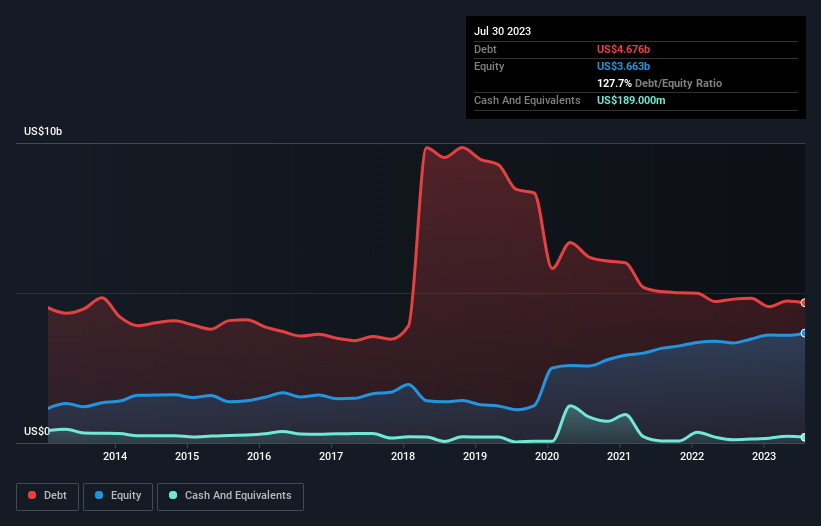Is Campbell Soup (NYSE:CPB) A Risky Investment?
Legendary fund manager Li Lu (who Charlie Munger backed) once said, 'The biggest investment risk is not the volatility of prices, but whether you will suffer a permanent loss of capital.' It's only natural to consider a company's balance sheet when you examine how risky it is, since debt is often involved when a business collapses. We can see that Campbell Soup Company (NYSE:CPB) does use debt in its business. But should shareholders be worried about its use of debt?
When Is Debt Dangerous?
Debt and other liabilities become risky for a business when it cannot easily fulfill those obligations, either with free cash flow or by raising capital at an attractive price. In the worst case scenario, a company can go bankrupt if it cannot pay its creditors. However, a more frequent (but still costly) occurrence is where a company must issue shares at bargain-basement prices, permanently diluting shareholders, just to shore up its balance sheet. Of course, debt can be an important tool in businesses, particularly capital heavy businesses. When we examine debt levels, we first consider both cash and debt levels, together.
See our latest analysis for Campbell Soup
What Is Campbell Soup's Debt?
As you can see below, Campbell Soup had US$4.68b of debt, at July 2023, which is about the same as the year before. You can click the chart for greater detail. On the flip side, it has US$189.0m in cash leading to net debt of about US$4.49b.

How Healthy Is Campbell Soup's Balance Sheet?
We can see from the most recent balance sheet that Campbell Soup had liabilities of US$2.22b falling due within a year, and liabilities of US$6.17b due beyond that. On the other hand, it had cash of US$189.0m and US$529.0m worth of receivables due within a year. So it has liabilities totalling US$7.68b more than its cash and near-term receivables, combined.
This deficit is considerable relative to its very significant market capitalization of US$12.0b, so it does suggest shareholders should keep an eye on Campbell Soup's use of debt. Should its lenders demand that it shore up the balance sheet, shareholders would likely face severe dilution.
We use two main ratios to inform us about debt levels relative to earnings. The first is net debt divided by earnings before interest, tax, depreciation, and amortization (EBITDA), while the second is how many times its earnings before interest and tax (EBIT) covers its interest expense (or its interest cover, for short). This way, we consider both the absolute quantum of the debt, as well as the interest rates paid on it.
Campbell Soup's net debt of 2.5 times EBITDA suggests graceful use of debt. And the fact that its trailing twelve months of EBIT was 7.7 times its interest expenses harmonizes with that theme. If Campbell Soup can keep growing EBIT at last year's rate of 18% over the last year, then it will find its debt load easier to manage. There's no doubt that we learn most about debt from the balance sheet. But ultimately the future profitability of the business will decide if Campbell Soup can strengthen its balance sheet over time. So if you're focused on the future you can check out this free report showing analyst profit forecasts.
But our final consideration is also important, because a company cannot pay debt with paper profits; it needs cold hard cash. So we always check how much of that EBIT is translated into free cash flow. Over the most recent three years, Campbell Soup recorded free cash flow worth 59% of its EBIT, which is around normal, given free cash flow excludes interest and tax. This cold hard cash means it can reduce its debt when it wants to.
Our View
Campbell Soup's EBIT growth rate was a real positive on this analysis, as was its conversion of EBIT to free cash flow. On the other hand, its level of total liabilities makes us a little less comfortable about its debt. When we consider all the elements mentioned above, it seems to us that Campbell Soup is managing its debt quite well. Having said that, the load is sufficiently heavy that we would recommend any shareholders keep a close eye on it. There's no doubt that we learn most about debt from the balance sheet. But ultimately, every company can contain risks that exist outside of the balance sheet. These risks can be hard to spot. Every company has them, and we've spotted 1 warning sign for Campbell Soup you should know about.
Of course, if you're the type of investor who prefers buying stocks without the burden of debt, then don't hesitate to discover our exclusive list of net cash growth stocks, today.
Have feedback on this article? Concerned about the content? Get in touch with us directly. Alternatively, email editorial-team (at) simplywallst.com.
This article by Simply Wall St is general in nature. We provide commentary based on historical data and analyst forecasts only using an unbiased methodology and our articles are not intended to be financial advice. It does not constitute a recommendation to buy or sell any stock, and does not take account of your objectives, or your financial situation. We aim to bring you long-term focused analysis driven by fundamental data. Note that our analysis may not factor in the latest price-sensitive company announcements or qualitative material. Simply Wall St has no position in any stocks mentioned.